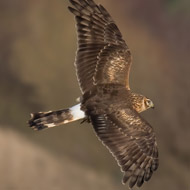
Two young satellite-tagged hen harriers have disappeared in Lancashire
Staff and volunteers at the RSPB are baffled by the disappearance of two young satellite-tagged hen harriers.
Named Sky and Hope, the female birds fledged earlier this year from nests on the United Utilities Bowland Estate in Lancashire, where RSPB staff and volunteers had been protecting them around the clock.
Hen harriers are the most threatened bird of prey in England and this season there were only four successful nests in the whole country. Sky and Hope were among the first chicks to fledge in England since 2012.
Both birds were fitted with lightweight solar-powered satellite tags. The tags are frequently used by conservation organisations to find out more about the movements of species and are designed to be operational for around three years.
Scientists who were tracking the movements of the birds became concerned when their tags stopped transmitting. On September 10, Sky's satellite signal suddenly stopped transmitting. The data suggests she was roosting at her last known location at the time. Hope's last known location was sent the following Saturday.
Since fledging the United Utilities estate, both birds had remained the Bowland area. Searches have been made, but neither Sky or Hope have been recovered.
Bob Elliot, RSPB's head of investigations, is doubtful that the loss of satellite transmission is due to technical failure: "In our experience, this satellite technology is normally very reliable and it is rare for them to fail for technological reasons. Losing two birds in such a short time frame and in the same geographical area is strange.
“Based on the last known data and our understanding of the technology, Sky appears to have suffered a catastrophic tag failure at roost suggesting either natural predation or human intervention as the likely causes for her sudden failure to transmit. However, we would not expect natural predation to stop the tag transmitting data so suddenly. Hope’s tag was transmitting reliably, with no evidence of any technical problems.”
TV presenter and hen harrier campaigner Chris Packham said: “It’s incredibly disheartening to discover that two of this year’s chicks have already apparently failed to survive. It shows how vulnerable hen harriers are and that four nests are nowhere near enough. Without satellite tagging, these disappearances might never have come to our attention but technology is on our side and we will keep watching.”
The RSPB have reported the disappearance of the birds to Lancashire Police and are offering a £1,000 reward. Anyone with information about either of the birds should contact Crimestoppers on 0800 555 111 or call the RSPB's confidential hotline on 0845 466 3636.
Image (C) Andres Trepte, www.photo-natur.de



 The Greyhound Board of Great Britain has published new vaccination guidance, with all greyhounds registered from 1 January, 2027 required to have the L4 leptospirosis vaccination, rather than L2.
The Greyhound Board of Great Britain has published new vaccination guidance, with all greyhounds registered from 1 January, 2027 required to have the L4 leptospirosis vaccination, rather than L2.